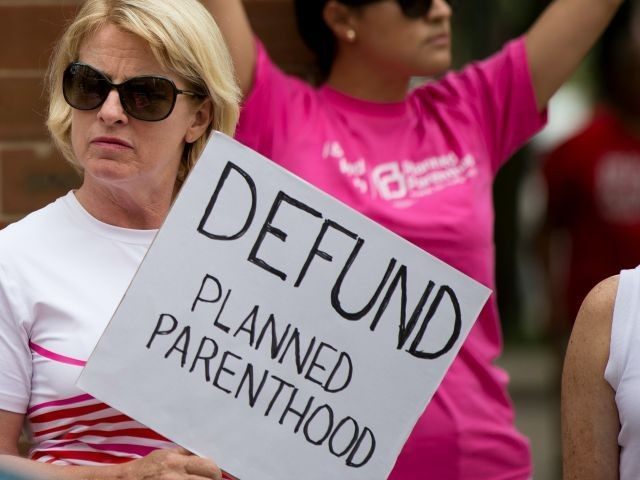Congress is in a month-long recess, but when it returns it will have just days to approve a spending plan to keep government open. That looming fight is very likely to turn on Planned Parenthood funding, with its half-a-billion yearly take from the federal Treasury.
The current authority for government spending expires at the end of September. Without a new continuing resolution or enactment of appropriations bills, large parts of the government will shut down at the end of the month. When it returns from its August recess, Congress will have just 10 legislative days to approve a new spending blueprint.
With full Republican control of Congress now, and a Presidential and important Congressional elections looming, conservatives will demand some concrete legislative victories in exchange for keeping the government open.
The Republican leadership, however, if the past is any guide, will want to extend current spending levels through next year and put off any substantive legislative battle until after the Presidential election. Their operating principle since Obama was first elected has been to put off any possibly divisive fights until after Republicans can reclaim both chambers of Congress and the White House.
Conservatives, however, generally believe they were elected to do something now to stem the systemic growth of government orchestrated by the Obama Administration. They also believe that any legislative fight now will ensure victory in the next election.
The first few months of Republican control of Congress have provided no tangible victories for conservatives. Arguably, the conservative cause has been set back on several important fronts. With fault lines between Republicans and conservatives breaking out in the open, conservatives will have to be able to claim some victory from the coming spending fight. Without it, Republicans will face open rebellion from the party’s base.
The last fight over government spending occurred in the context of the pending implementation of ObamaCare. Texas Sen. Ted Cruz, who is running for President, led an effort to block new spending that allowed ObamaCare to take effect. In the end, the government was shut down for several days, ObamaCare came into effect and Republicans won an historic election victory just a year later.
With ObamaCare now fully enmeshed in federal law and policy, conservatives will need another significant issue through which to frame the funding debate. A growing scandal at taxpayer-subsidized Planned Parenthood is the most likely candidate for that debate.
Planned Parenthood occupies the extreme wing of the pro-abortion side of the abortion debate. The non-profit receives around $500 million a year from the federal government, ostensibly for services that don’t include abortion.
The current scandal engulfing Planned Parenthood doesn’t directly involve its abortion procedures. Undercover videos from an activist group, Center for Medical Progress, have detailed Planned Parenthood officials discussing the harvesting of fetal tissue after abortions and even negotiating the prices charged for that tissue.
The videos released to date suggest that Planned Parenthood may be in the business of selling body parts from abortions. Such transactions are illegal in all but very specific cases.
Most of the mainstream media have ignored the scandal. Conservative activists and lawmakers have not, though. In the House, 18 conservative lawmakers have already vowed to reject any new spending bill that continues to fund Planned Parenthood. Speaker Boehner can only lose 29 Republicans on votes before he needs Democrats to pass legislation.
Senate Majority Leader Mitch McConnell has an even narrower path to overcome the 60-vote threshold that is commonly accepted to pass most legislation. He could, of course, dispense with the 60-vote threshold by simply requiring opponents to actually filibuster any legislation, but modern custom has avoided that.
Conservatives–and Republicans, for what it’s worth–should relish a spending debate over taxpayers on the hook for Planned Parenthood funding. Overwhelming majorities of Americans, even those who identify themselves as pro-choice, oppose taxpayer funding for abortions.
Planned Parenthood gets around this with an elaborate public relations dodge–that its government grants support things like cancer screenings and birth control. The onus for making that case to the public is on the organization and its defenders, though, not conservatives.
The allegations that the organization is harvesting baby parts to sell for research are disturbing and occupy a policy landscape far removed from the actual question of abortion rights. One does not have to be a strong social conservative to feel discomfort watching the undercover videos and the subjects’ cavalier tone while the gruesome issue is discussed.
Even pro-abortion Hillary Clinton said she found the discussions recorded in the video “disturbing.” Even setting aside the emotionally charged abortion issues, the scenes depicted suggest serious criminal activity. There is no reasonable argument for continuing to fund an organization that may be engaged in criminal behavior. At the very least, a thorough investigation should clear up that question before another federal dollar is given to the organization.
The money involved is a rounding error in the federal budget. It is significant enough, though, to get the public’s attention. Regardless of the actual fiscal impact, though, there is a significant question of principle in this possible debate.
This is such a line-in-the-sand issue for conservatives that even Republican leadership should recognize its political potency. If conservatives and Republicans can’t agree that Planned Parenthood shouldn’t receive taxpayer support, at least until it has been exonerated of violating federal law, then there is no hope for that existing coalition.
If the Republican leadership won’t fight on this ground, where it has the clear support of the American public, then it won’t fight on any ground. We’ll at least know that before we decide whether or not to vote in 2016.

COMMENTS
Please let us know if you're having issues with commenting.